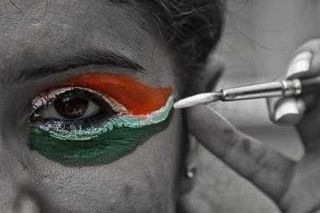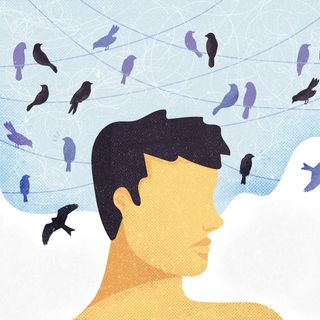
The Psychology of Patriotism
Pride in country can be both conditioned and innate. It can also be warped into something else entirely.

I have my popcorn carefully balanced on my lap, nachos teetering on the arm rest, flirting with the Coke nestled in the cup holder. Now, a sign flashes on the movie screen, “Please stand up for the national anthem.” Everybody around me starts shuffling around to stand up straight; some are even reverently looking at the screen and mouthing the song. A minute ago, their mouths were stuffed with movie theater snacks. How did the transition, from nonchalant moviegoer to patriotic Indian, take place in a matter of seconds? Is the feeling of patriotism so mindlessly conditioned, or deeply felt, that it can be summoned at any place, at any time?
The answer is: both. We, as human beings, are evolutionarily conditioned to long for connection and safety, according to “The Psychology of Patriotism” by Michael Bader. This vulnerability to want to connect to and belong to something bigger, in order to be a part of a larger community, makes us “vulnerable to manipulation and exploitation,” he writes.
Bader compares the feeling of patriotism with that of a child needing a family: the dependence of an individual on systems of support for survival triggers a need for protection, and incites idealization of authority. “When parents are protective and reasonable, children grow up with a basic sense of security and an ability to rely on others,” Bader writes. “When parents fail to protect children and exercise their authority in arbitrary, frightening, or inconsistent ways, children grow up with a basic sense of insecurity and difficulty trusting others.”
Patriotism is, of course, conditioned, too. In India’s history, patriotism has played the role of a unifier. During the colonial era, the country was fragmented into territories under the British, and separate kingdoms governed by Indian rulers. The process of fighting for independence and mobilizing Indians for the freedom struggle was strengthened by inculcating patriotism into the masses, through newspapers such as Harijan and Bande Mataram, pamphlets distributed nationwide, books, movies and music. Patriotism not only served to induce political will among Indians, but helped to unify the country against a common enemy: the British colonial rule.
After gaining independence in 1947 and surviving the trauma of the partition, the same patriotic fervor that helped achieve independence, was instrumental in solidifying a national identity that colonialism had attempted to erase for centuries. In the years that followed, expressions of patriotism, from filmmakers making movies about national pride, to schools mandating singing of the national anthem every day, became cemented in society. While feeling part of a larger whole is a natural human instinct and has benefited India immensely in the past, it might be time to evaluate what expressions of patriotic fervor serve to accomplish today.
Any countries that form, or become independent, through political struggles, such as India, will host a citizenry that has a heightened sense of loyalty, Tom Smith, director of social research organisation NORC’s Center for the Study of Politics and Society, told Forbes. But there is a point when heightened patriotism soars too high.
Related on The Swaddle:
Why We Should Care That Shehla Rasheed Quit Twitter
In 2016, when the Supreme Court passed the order that mandated the national anthem be played in all cinemas and that movie-goers must stand up and perform their patriotism, there were several instances where self-proclaimed vigilantes beat up those who didn’t acquiesce to the rule. A film club in Kerala challenged the practice at the time, calling out the false equivalence between an “outward show of respect” and an ”actual sentiment of respect,” the BBC reported. (As of January 2018, it is no longer mandatory for movie halls to play the national anthem, but if they choose to do so, then you’ll have to keep the popcorn aside.)
Patriotism instills the feeling of a “we” — automatically generating the concept of a “them.” And it is easier and more rewarding to take pride in your own patriotism, when those that exist outside of it are deemed “bad” and “dangerous,” which then makes the patriot feel “good, righteous and safe,” according to Bader. Incidentally, these are the same feelings sexist, racist and homophobic people use to justify and fuel their bigotry, Bader says.
That’s when patriotism is warped, becoming “exclusionary and superior” and promoting a “better than” mentality, argue Michael W. Ledoux and Thomas Marshall in “Can We Teach Patriotism in Schools.” Some call the devolution nationalism.
George Orwell defines nationalism as a “habit of identifying oneself with a single nation or other unit, placing it beyond good and evil and recognizing no other duty than that of advancing its interests.” He writes of nationalism as a concept inherently linked with a desire for power. “The abiding purpose of every nationalist is to secure more power and more prestige, not for himself but for the nation or other unit in which he has chosen to sink his own individuality,” Orwell writes in Notes on Nationalism. Forget outspoken English novelists, even Rabindranath Tagore, India’s homegrown literary legend and lyricist of the national anthem, was staunchly against nationalism and all its trappings.
Related on The Swaddle:
A Student was Arrested in Tamil Nadu for Calling Out the BJP
Nationalism “is the particular thing which for years has been at the bottom of India’s troubles. It is my conviction that my countrymen will truly gain their India by fighting against the education which teaches them that a country is greater than the ideals of humanity,” Tagore wrote in “Nationalism in India.”
One way to make sure a population isn’t completely blinded by pride for their country is to distinguish between a patriotism of blind love and obedience, and one that employs critical thinking and disobedience, according to “On the Varieties of National Attachment: Blind versus Constructive Patriotism” published in the International Society of Political Psychology. The former results in a more bellicose population, while the latter gives rise to a smarter one.
Praise your country or criticize your country, but for the sake of all that is intelligent, please have a good reason.
Rajvi Desai is The Swaddle's Culture Editor. After graduating from NYU as a Journalism and Politics major, she covered breaking news and politics in New York City, and dabbled in design and entertainment journalism. Back in the homeland, she's interested in tackling beauty, sports, politics and human rights in her gender-focused writing, while also co-managing The Swaddle Team's podcast, Respectfully Disagree.
Related


What It’s Like To Live With: Adult ADHD
